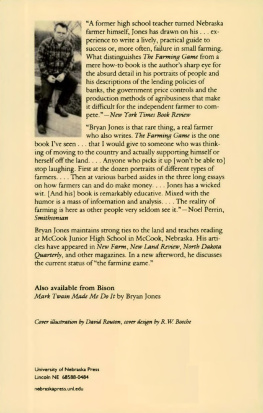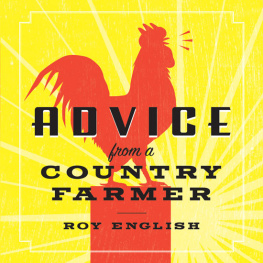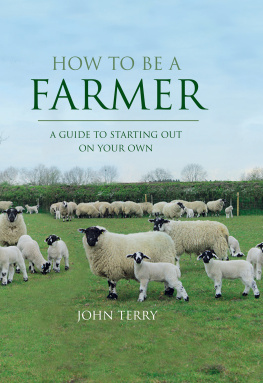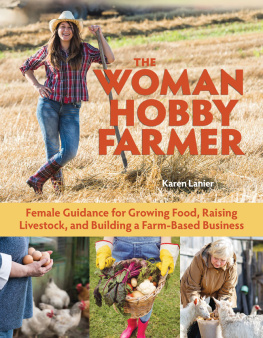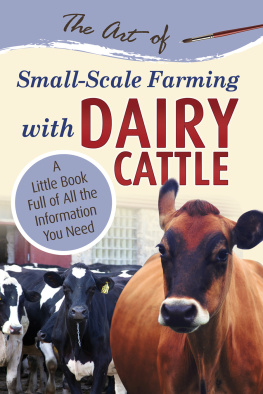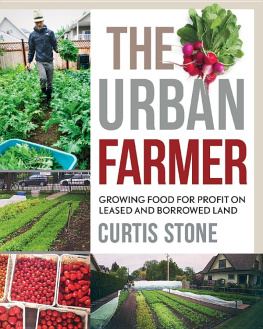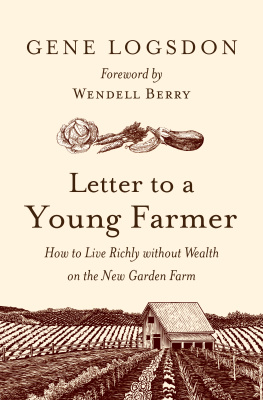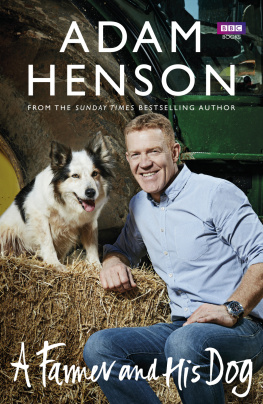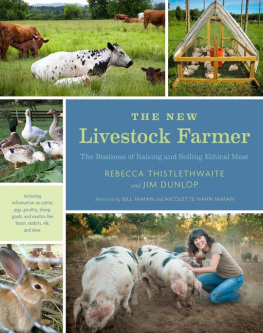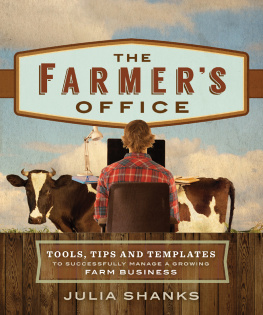
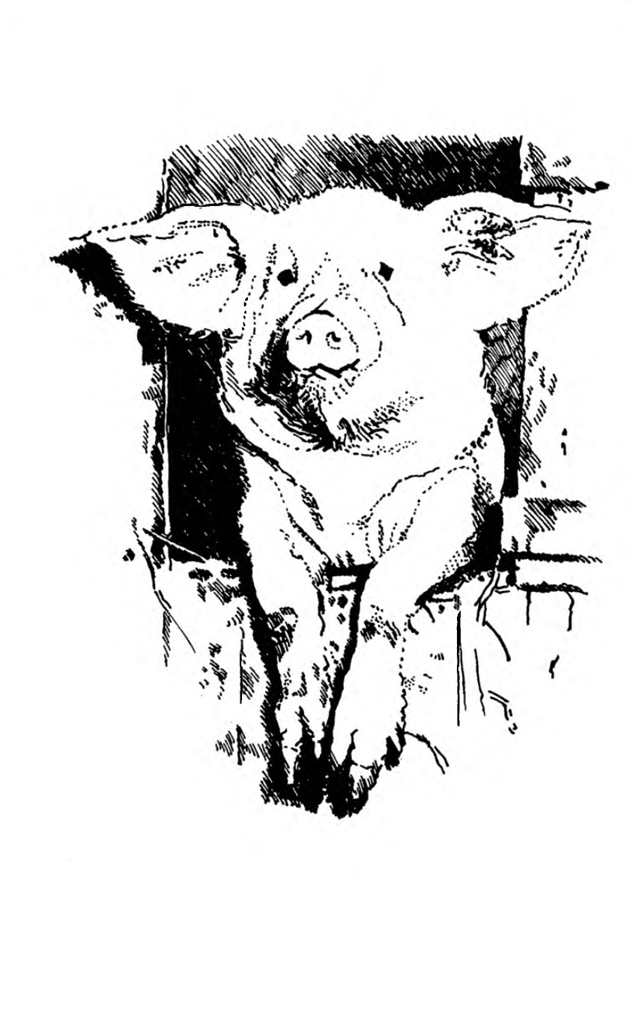

Portions of this book have appeared in slightly different form in the following publications and are used with permission: The Irrational World of Farm Finance in the New Farm magazine, January 1981, pp. 34-39; Sherman the Scalper in the New Land Review, no. 14,1979-80.
Copyright 1982,1995 by the University of Nebraska Press
All rights reserved
The paper in this book meets the minimum requirements of American National Standard for Information Sciences Permanence of Paper for Printed Library Materials, ansi Z39.48-1984.
Library of Congress Cataloging-in-Publication Data
Jones, Bryan, 1945
The farming game / Bryan Jones; with a new afterword by the author.
p. cm.
ISBN 0-8032-7582-x (pbk.: alk. paper)
ISBN 978-1-4962-1395-2 (epub)
ISBN 978-1-4962-1396-9 (mobi)
1. AgricultureHigh Plains (U.S.) 2. FarmersHigh Plains (U.S.)
I. Title. [S44I.J68 1995] 338.i0978dc20 94-44844
CIP
The publisher does not have any control over and does not assume any responsibility for author or third-party websites or their content.
To my parents, Lowell and Mattie, who feed the sheep

Drawings by David Routon

Introduction
No one seemed to know why the government was suddenly interested in helping small farmers after spending the better part of thirty years systematically eliminating the species. But there we were, assembled in Des Moines, surrounded by bureaucrats from half a dozen government agencies and private think tanks. We had been divided into discussion groups and assigned various topics. From our testimony might come some lucrative program proposals to justify a new assault on the national treasury. While the tape recorders spun and the pinstripe set took notes, farmers dutifully went to work. They complained about interest rates, the government, low commodity prices, the government, inflation, the government, taxes, the government, inadequate access to capital, the government, a lack of leisure time, but mainly the government. None of the seasoned bureaucrats experienced any visible discomfort from the onslaught. Secure in their jobs, they took reams of notes and smiled pleasantly.
At one point during the controlled chaos, our oily little facilitator, who moonlighted as a state Farmers Home administrator when he wasnt managing presidential campaigns, asked us to summarize our long-term farming goals. One wanted a bigger power boat. Another hoped that his grandchildren could inherit land that hadnt eroded into infertility. An organic farmer saw himself as a prophet spreading light through his own example. During the unusual period of quiet that followed while others pondered the question, I ventured that I wanted to make money and felt farming offered more attractive opportunities to accumulate large sums of capital than most other lines of endeavor. Those farmers that didnt boo did some serious hissing.
They informed me that it was impossible for farmers to make money. Sentiments like mine were dangerous to agriculture. Greed led fast-buck operators to wreak havoc on the land by overcropping and selling to foreign investors. I was expressing an unworthy motive before government bureaucrats who were there to help us and who would probably feel less charitable if we revealed ourselves to be as interested in filthy lucre as everyone else. One fellow farmer thought money might be suitable as a means to an end (farming the right way) but not as an end in itself. With that, we moved to more important questions concerning the general incompetency of Farmers Home administrators and the need for parity pricing of farm commodities. We completed our work, and the record of deliberation is presumably filed in a government computer somewhere. The original impetus for the conference died a quick death. Perhaps government funding had run short of expectations or some new oppressed minority had stolen our limelight. At any rate, smallfarm problems were put on a back burner.
In the months since, I have listened more closely when farmers discuss their aspirations. The unifying theme of these conversations is concern for money in all its various forms. Most of my acquaintances want more of that commodity than they now have. The precise method of gaining the objective is usually the subject under discussion. How can anyone afford to buy land at these prices? Should I plant more soybeans this year, or will the Brazilians flood the market? What are bred cows selling for, and can I expect a profit if I buy some?
Were the delegates in Des Moines a subspecies with completely different characteristics? Were they lying to themselves? Dont power boats and more leisure time imply an increase in income? Does a greed deficiency hamper small farmers in their survival efforts? These questions begot more. What personal qualities allow some farmers to prosper compared to others? Where is the farming industry headed? How did we get where we are? Is federal agricultural policy shortsighted or part of some rational master plan? Would an increase in the farm population result in national social benefits? Could a model farming operation be constructed that could be followed by rookies?
The Fanning Game is the result of my curiosity. Most of the agricultural activities I am describing are located on the High Plains area of Kansas, Nebraska, Oklahoma, North Texas, eastern Colorado, and the Dakotas. This was the last region of the country to be settled, and in many ways it remains a land of opportunity. Land is not as expensive as elsewhere in the country. There are few restrictions on economic mobility, and society is relatively open. The High Plains area has never matured socially; changes have come too rapidly. Farm communities were barely established when the Great Depression tore families from the land and scattered them to the winds. High prices and adequate rainfall during World War II helped the survivors to gain a tentative financial stability that lasted until 1953. Then Ezra Taft Benson, Eisenhowers secretary of agriculture, launched his massive program of forced urbanization that has been continued somewhat haphazardly by his disciples to the present day.
Growing conditions on the High Plains could best be described as erratic. Devastating hailstorms and intense periods of drought are common enough to make two good crop years in a row a cause for general rejoicing. A farmer in Illinois may cry about a dry spell two weeks old, whereas a Kansas farmer might feel fortunate to get three good rains during a whole summer. This explains in part why land in this area is relatively inexpensive compared with land in states where crop yields are more predictable. The constant threat of financial ruin loosens folks up and is a definite social leveler. Who is going to put his nose in the air when next weeks hailstorm could wipe him out? A family whose wealth is in deep, black Illinois farmland with forty inches of annual rainfall can count on some sort of an income. They might plan ten years ahead of time to send a daughter to an expensive finishing school. After the pocket calculator hits a half million or so, they may move up to a better country club and trade the old Buick on a Mercedes. A farmer on the High Plains might come up with the same total and see half of it evaporate in one summer of blistering drought. This is not to say that plains society is totally egalitarian, far from it. It is just that the social vibrations emanating from Washington, Kansas, are considerably more relaxed than those of Quincy, Illinois, where land is held in firm hands and changes ownership only once every two centuries or so. It is a rare country newspaper on the High Plains that hasnt a couple of sale bills printed inside, and during tough times there may be a dozen a week. Ownership is difficult to obtain if no one wants to sell. Since capital accumulation in general and land acquisition in particular are the goals of the game, an area where land is sold regularly has an advantage for the novice and experienced player alike. That is why the rougher, drier parts of the High Plains offer perhaps the best chance for the small farmer to survive and the best opportunity for new people to enter the business.
Next page
